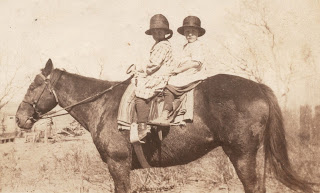This
summer found Mother, Bernyce Smith Gates, recalling snippets of the Dust Bowl Era of the 1930s. She enjoyed her entire childhood during this dire time but affirmed readily that she
was sheltered from the worst of it, especially the emotional and mental stress
of the heat, drought, and financial despair.
We
discussed hot summers in the early 1910s and how Grandma Gladys Rainey Smith remembered her father, William
Marion Rainey, awakened her and her siblings at 4 a.m. (5 a.m. according to our
Daylight Savings time). They trudged to the field and waited for the sun to
rise so they could beat the sweltering summer heat of the afternoon. Then Great-Grandpa Rainey and his children of an age old enough to use a
hoe began the back-breaking work in the corn or cotton field.
I
clicked the photo below of the grasshopper. Upon showing the photo to Mother,
she remarked, “I’ve seen a line of them, just like an army of soldiers, crossing the road!” She doesn't remember the devastation, but recalls being warned against trying to catch grasshoppers because of the poison used to eradicate them. She observed the phenomena of the grasshopper army just east of the twin bridges, on what is now Big Bend Road south of their home. At that time, her parents leased Lora Kirk Betts' place so Mother could walk to the Belford School and her maternal grandma's home.

Mother
mentioned she vaguely recalls serious discussions about feeding the livestock.
They never baled hay but planned to have stalks for winter forage. On a rare
few years, her parents left corn stalks in the field after harvesting the corn, preserving the corn stalk field for livestock grazing during winter. More often, they cut the corn stalks
and shocked them (bundling them together) and rationed them out to the cattle
during the cold winter months.
Much to Mother’s delight, she spent
two summers with her much-loved aunt and uncle, Emma and Bill Buckley. They had
no children,
and Mother had no siblings. My father always described my
mother as “quiet.” She sounded like the perfect child to have for a month,
especially if the couple was unaccustomed to having a child in the house.
 |
| Mother around age 8 |
Since her uncle managed the theater in Vinita, Oklahoma, Mother was treated to one or two of the latest "talkies" each summer. With Mother's musical talent, it is understandable that the most memorable ones were "Follies-type" extravaganzas - lots of singing and dancing. The beautiful costuming and sets captured her attention even though they had been produced only in black and white. Uncle Bill set up a reward system for
little Bernyce. She had certain chores to do during the week to get points. She earned a
brand, new pair of shoes each summer. What a big deal for a little girl living
during the Great Depression!
According to Mother, her
Uncle Bill loved to tease her about not making his requirements to earn the new
shoes and many other boons with which they gifted her. The quiet little girl
from the Bend always hit the mark to be rewarded by her dear uncle.
Lest someone think my mother borders on perfect, she
tattled on herself concerning one of the summer days with Aunt Emma. Aunt Emma
had cut a watermelon which was more than the three of them could consume. She
fixed a beautiful plate of the ripe melon and sent little Bernyce across the
street to share with the neighbors. Mother retold it using these words, “I
don’t know what possessed me, but I took a bite out of it!”
Fortunately, Aunt Emma observed her naughty behavior from
the window and called her back. I asked what Aunt Emma said. Mother said Aunt
Emma’s reply was, “I thought you might do that.”
Don’t we all have a “watermelon bite moment” like Mother? Solomon, the wisest man who
ever lived, wrote in Ecclesiastes 7:20:
For there is not a
just man on earth who does good and does not sin.
As the previous verse states, all people sin, and for
this reason, Peter ended his message recorded in Acts 10:43 with this appeal to
his hearers:
All the prophets
testify to this: everyone who believes in Jesus receives forgiveness of sins
through His name.”
Just as Aunt Emma forgave Mother of her egregious bite
from the watermelon plate, so God forgives us. I never recall Aunt Emma
mentioning Mother's mischievous behavior as a child during her summer visit. Neither does God. What a wonderful final thought from the writer of Hebrews in
chapter 10, verse 17 as we read these words of God:
“Their sins and their
lawless deeds I will remember no more.”
Why would anyone not respond to that love and
acceptance?








.jpg)
%2Bcovered%2Bwith%2Bwisteria%2Bvines%2Bbuilt%2Bin%2B1899.jpg)